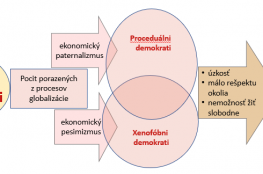Dear readers, here comes another piece of my journalist work, an analysis written originally for slovak daily Pravda (published 2009-04-29, click here). This time an english version.
SLOVAKIA, AS WELL AS THE OTHER STATES OF VISEGRAD GROUP or the Baltics have entered the European Union on 1st of May, 2004. Five years is not just the roundest anniversary to celebrate, but still an opportunity to look back and see, if there really is a reason to open a bottle of champagne.
No doubt there will be a flock of politicians trying to persuade everybody that it is an enormous success of our countries, a story of an ugly duckling becoming the white swan. But frankly – is it so?
All right… The countries are comparatively stable. There is no straight threat to democracy and one could have spoken about rising prosperity until recently (just for the record – the economic crisis is not CEE product). Millions of euros are flowing from european funds. However, nowadays Slovakia is still far from the Union that the whole post-communist Europe wanted so much to enter a decade ago (The Union being somthing different itself is not an issue here).
European Communities were founded to promote business and avoid another war on continent at first place. As time passed the EU became THE club of free democratic states. The synonym for a civilised society that everybody wants to be part of. EU ended tha last century as an association of rich who not only helped the poorer inside, but also the neighbours at the outer border. Under these circumstances it was self-evident to apply for membership. Getting in meant the biggest prestige imagineable.
Despite the fact that the entrance conditions were not a banality, it was in the West best interest to integrate the CEE countries. The ten former soviet satellites comprised one huge scorched market with dreamy opportunities in the field of investment and export business (setting aside all the governments distributing stimulus and tax relief for free). Moreover the promise of membership was the best tool for securing peace and stability east to the EU – region where lot of states were falling apart and new ones emerged.
The result? The year 2004 (and 2007) brought new members into the European union. Members, who would under any other circumstances have not be considered as ready. The Copanhagen criteria are not so detailed, but the corruption in the public sphere, doubtful rule of law or the state of political elites and their behaviour are surely not compatible with what all of us imagine as a democratic and modern society. So when the European Commission stops the money-flow from funds because Slovaks and Bulgarians are stupidly stealing it, the countries must resemble small boys taking some change from parents’ wallet without permission. And look at Romania giving out its passports to Moldavians, Slovenia blocking the Croatian negotiations, with the Czechs destroying their own government during its presidency hitting the top of imaginary pyramid of stupidity.
Irresponsible, unreliable, careless. This is how the low societal culture could be described in many CEE countries (I bet 10 € on Slovakia to be in top 3).
So is this how Brussels imagined its new members in the club? Is this a success for the Union, considered so modern and compact in the past? And probably the most important question – can Slovakia (and other CEECs) be satisfied with its performance in the Union of the 21st century?

